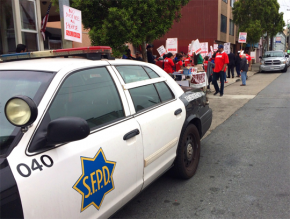“Bargaining” by cop
, a delegate to the San Francisco Labor Council, reports from the picket line of a one-day strike of caregivers.
A LIVELY San Francisco picket line of 50 caregivers from the National Union of Healthcare Workers (NUHW) began their one-day strike of San Francisco Nursing Center (SFNC) in the very early morning hours of July 22.
NUHW negotiator Dennis Dugan told me the strike was primarily to preserve union-contract Kaiser Foundation health benefits that were unilaterally eliminated after San Diego-based Providence Group Inc. took control of the SFNC long-term care facility in May.
As a result, workers were dumped into a grossly inferior and more expensive pool of health insurance choices. And since then, the company has refused to negotiate with the union, limiting themselves to e-mail exchanges through a federal mediator.
Nonetheless, despite the disruptions brought upon SFNC by Providence, there were other examples on this day of the warm, compassionate and very human connections in the facility. For example, convalescing patients in wheelchairs and others sitting on comfortable lounge couches crowded the front lobby area to exchange waves and smiles with their favorite nursing assistant now unaccustomedly out of reach and on picket duty.

"These sudden cuts to our health care will make it difficult to recruit quality caregivers in the future," says Certified Nursing Assistant Marilyn Aquino, "and that will undermine the quality of care SFNC residents receive."
Several strikers asked me a version of this question: "How can we properly care for our elderly and sick patients with our own health in jeopardy because we will be unable to afford full care?"
Of course, health care is a huge issue for millions of Americans who often delay care because of the expense. This is a matter of record. However, when this reality hit the low-paid workforce at SFNC who previously enjoyed good contract health benefits, they united as never before.
THIS WAS the first strike ever at the facility, and for almost everyone on the picket line, mostly Latinas and Filipinas, it was their first time too. So, workers reported with great pride their 100 percent participation in the one-day strike.
It was a start. Everything was going fine. A noon rally of several dozen community and union supporters lifted spirits and was topped off by pizza, snacks and drinks being spread around.
So when a San Francisco patrol car with two cops showed up at around 1 p.m., everyone took it in stride. The pickets did not stop moving and the chants did not stop echoing. Everyone assumed it was just a routine check--maybe asking folks to keep the sound down or cautioning us about street traffic.
But it turned out to be anything but routine.
These cops were actually called by the SFNC administration to arrest prominent members of a community delegation that had just entered the facility to parley with the employer.
The delegation facing arrest included SF Board of Supervisor John Avalos; top aides of two other city supervisors; Tim Paulson, executive director of the San Francisco Labor Council; and leaders from SEIU 87, the Filipino Community Center and the Chinese Progressive Association.
Incredulously, to make this scene on the inside all the more absurd, San Francisco Sheriff Ross Mirkarimi, a supporter of NUHW workers and the strike, was himself picketing outside.
Paulson told me that the company's security officer told him, "You are trespassing," and demanded that he leave or be subject to arrest. But Paulson and the others refused to leave before speaking with the onsite administrator and delivering the delegation's message that "these striking workers and NUHW do not stand alone."
Members of the delegation explained to the security guard that the delegation included elected officials as well as union and community representatives who all believed it unacceptable to "unilaterally scrap existing health benefits and impose other sick day and vacation cuts while refusing to bargain."
And, according to NUHW, this is exactly the record of the new owners.
Instead of negotiating with NUHW directly, Dugan continued, the company hires Josh Sable, a notorious anti-union attorney from Los Angeles, who represents another nursing home operator under investigation for poor care and "flagrant disregard for human life," according to the Sacramento Bee.
A bad sign indeed.
"So, actually," Dugan commented to me, "while the whole confrontation inside SFNC unfolding before our eyes looked ridiculous and was quite shocking, it is not all that surprising."
The new owners have been stonewalling us from the beginning, he said. "In fact, the community delegation got a dose of SFNC's new style of bargaining," Dugan mused.
Nothing like this in recent memory has happened at SFNC where good union contract benefits were enjoyed by the workers who, at the same time, maintained SFNC's state-sanctioned standards at a very high level.
"If it's not broken, don't fix it," an exasperated Dugan said. "Providence has come in and broken it."
INDEED, THE new owners' old, outmoded command-and-control style of management was on vivid display for all the delegation to see. But when community representatives refused to budge until they spoke with an onsite administrator, who apparently was holed up in his office, a rapid-fire series of phone calls between company representatives ensued, and a semblance of sanity was eventually restored.
Delegation members reported to me that, finally, the onsite administrator crawled out of his office to report a phone call from the Providence CEO from Los Angeles "that he did not like the strike, did not want another one and was very eager to begin negotiations with the union."
As a result, a union organizer told me that the whole day was considered by the workers as a big success: "Our message was heard loud and clear--the company's anti-worker behavior is not acceptable in San Francisco, and when it is attempted, we mobilize extensive community outrage against it."


